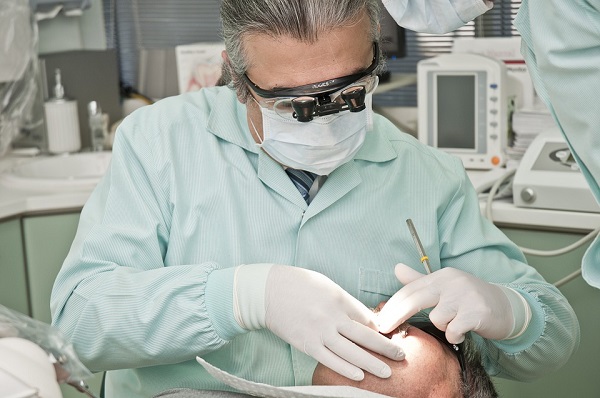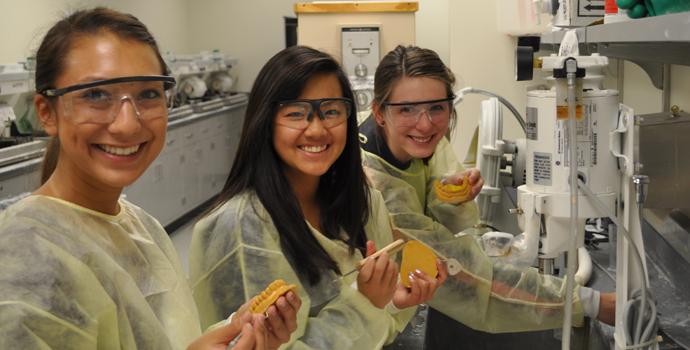
The teeth are some of the most important parts of the human body. Not only do teeth help individuals digest food, they allow most to exude confidence and personality. As such, when there is a problem with a tooth or several teeth, quality of life can decline tremendously.
Dentists are professionals who keep patient teeth healthy. Like with most fields of medicine, dental practices can be either general or specialized. General dentists are the primary source of dental care for patients. They perform routine cleanings and checkups. If a dentist notices the tell-tale signs of a cavity or other problem, they use their skills to remedy the situation. For preventative and restorative care involving gum disease, fillings, veneers, bridges, crowns and root canals, general dentists are usually a patient’s go-to source.
Of course, teeth are more than what a person sees when opening the mouth. Beneath the surface, teeth have tiny canals. These canals have blood vessels, soft tissue and nerves that can become infected. Inside the tooth, soft tissue also exists. This tissue is called pulp. While general dentists often treat these areas, they frequently refer technical problems to endodontists. Endodontists specialize in the treatment of canals and pulp.

How Does A Dentist Become An Endodontist?
The American Dental Association recognizes nine types of special dentists. One of these specialty areas is endodontics. To become an endodontist, individuals must successfully complete a dental course at an accredited dental school. Then, these dentists must finish a two- or three-year postgraduate training program in endodontics. Before starting practice as an endodontist, professionals must pursue licensure in the jurisdiction where they plan to work. Throughout the course of their practices, endodontists also must take continuing education courses to ensure they are familiar with the latest diagnostic and treatment methods.
How Are Endodontists Different From General Dentists?
For many patients, the source of toothaches is infected soft tissue. While many general dentists perform root canals, they often refer complicated procedures to endodontists. Since endodontists specialize in canals and pulp, they are usually better equipped to perform technical procedures on soft tissue. In fact, endodontists perform several times more root canals than general dentists, using extensive clinical experience to achieve successful results for patients.
Clinical expertise isn’t the only feature that distinguishes endodontists from general practitioners. In addition to extensive experience, endodontists often have high-tech equipment that helps them perform difficult procedures. These devices often include ultrasonic instruments, digital imaging equipment and high-resolution microscopes. With state-of-the-art technology, endodontics can often tackle procedures that general dentists simply won’t attempt.

What Do Endodontists Do?
With their expertise and equipment, endodontists are often root canal specialists. When performing a root canal, these professionals treat decay and infection in the canals beneath the surface. To do so, endodontists drill a small hole in the tooth. This access point allows professionals to remove infected or decaying pulp. Once gone, endodontists can add a sterile filler to the tooth. This filler prevents future infection from attacking the sensitive parts of the mouth.
Because root canals usually require general anesthesia, endodontists must know how to safely use anesthetics. They must also be proficient with a variety of dental instruments. While general dental curriculums teach these skills, postgraduate training helps endodontists master them.
In about 95 percent of cases, root canals are successful. That is, these procedures usually relieve discomfort while helping to save the patient’s natural tooth. Root canals are not, however, the only work endodontists do. On the contrary, these professionals perform procedures that general dentists often avoid. Simply put, if a patient has a complicated problem with the soft tissue in or around the teeth, a general dentist may refer him or her to an endodontist.
Is There Enough Work For Endodontists To Stay Busy?
General dentists are a patient’s first choice for dental care. That makes sense, as general practitioners treat a variety of dental ailments. They also provide preventative care and tooth maintenance that helps patients avoid serious dental problems. Since endodontists are specialists, many aspiring dental professionals often wonder if endodontists have enough work to stay busy.
Endodontists don’t only perform root canals, although this is an important part of their work. Instead, they often serve as soft-tissue experts. That is, when a patient wants to be certain he or she is making the right dental-health decision, endodontists collaborate with general dentists to paint a complete picture. They also perform emergency procedures when patients have suffered dental trauma.
Patients often seek the expertise of an endodontist if they have a complicated dental history. For example, a patient may need an endodontist if they have had previous root canals. They may also need help from an endodontist if root canals have not succeeded in the past. Alternatively, patients may ask for assistance from endodontic professionals if they have nebulous tooth pain or a unique anatomy. Regardless, when general practitioners are unable or unwilling to provide treatment, patients often consult with endodontists.

Can An Endodontist Practice General Dentistry?
Because they play an important role in treating disease and injury, endodontists usually have enough work for a robust practice. This work can either be referral-based or standalone. New professionals, however, often wonder if they should practice general dentistry until their practices take off. Whether an endodontist can also work as a general dentist involves a careful analysis.
Expertise
Before becoming an endodontic specialist, individuals must successfully complete a dental curriculum at an accredited dental school. Then, they must participate in a postgraduate training program that lasts two or three years. Therefore, all endodontists should have the expertise to work as general dentists. An endodontist who has worked as a specialist for years may, however, be a bit rusty in general dentistry. Accordingly, before offering general dental services, professional endodontists must brush up on their basic skills. This may involve taking continuing education courses or working with a general dentist.
Before specializing as an endodontist, professionals must meet licensing requirements. All state boards have detailed regulations controlling who can work as a specialty dentist. If an endodontist violates the requirements of the licensing board, he or she may be barred from practicing any type of dentistry in the jurisdiction.

Practical Concerns
Moving from a specialized practice to a general one often involves some practical concerns. Those who have not managed office workers, dental hygienists and others may have difficulty assimilating to a general dental practice. Fortunately, the American Dental Association and other professional organizations have tremendous resources to assist general dentists with managing family practices.
Endodontists who are considering offering general dentistry services have another practice concern to weigh. Since much of the work endodontists do is referral-based, professionals may worry about competing with the general dentists that provide those referrals. That is, family dentists may not refer work to an endodontist who offers general dentistry out of fear of patient poaching.
Additionally, specialty dentists may lose some prestige if they also work as general practitioners. Since endodontists have a public perception of being high-level dental specialists, they may not want to diminish that esteem by offering general dental services. Likewise, they may have less time to devote to continuing endodontic education if they are building bridges, filling cavities, treating gums or cleaning teeth.
Licensing Limitations
State boards provide licenses for both general and specialty dentists. These boards have detailed rules that control the sort of dentistry professionals can practice. They may also set limits on advertising.
In many places, licensing boards consider general dentistry to be beyond the scope of endodontics. As such, endodontists are regulatorily prohibited from working as a general dentist. Accordingly, before determining whether an endodontist can offer services as a professional dentist, individuals must check with their state licensing boards.

Advertising
Licensing authorities may severely limit the sort of advertising that specialty dentists can do. If an endodontist holds himself or herself out as such, he or she may not be allowed to offer any other dental services in advertisements. Of course, advertising regulations vary from jurisdiction to jurisdiction, so all general and specialty dentists must check with local licensing boards to be certain they are not violating them.
Insurance
Most diligent dentists carry malpractice insurance. This coverage protects dentists from costly damages caused by their errors or omissions. When purchasing malpractice insurance, dentists must be certain their policy covers all of the procedures they offer. They also must be careful not to engage in any conduct that isn’t covered by the insurance package. If they do, they may be vulnerable to expensive lawsuits. Since insurance for specialty dentists is often tailored to the procedures specialists perform, broadening a practice to include general dentistry is usually not feasible.
Final Thoughts
Working in dentistry is an exciting prospect. Those who choose this career path often have a rewarding experience. With nine specialty fields of dentistry, professionals can often choose how they want to apply their talents and skills. For endodontists, working as a general dentist may be possible. Before choosing to offer general dental services, though, endodontists must carefully consider a few important factors.

Leave a Comment